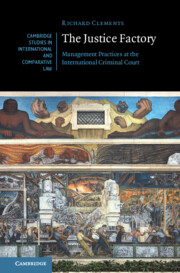Book contents
- The Justice Factory
- Cambridge Studies in International and Comparative Law: 182
- The Justice Factory
- Copyright page
- Contents
- Figures
- Acknowledgements
- Abbreviations
- 1 Introduction
- 2 A History of the International Criminal Court’s Managerial Present
- 3 The Managerial Court
- 4 The ICC Expert
- 5 ICC Legal Argumentation
- 6 ‘In a Technical and Political View’
- 7 Conclusion
- Select Bibliography
- Index
- Cambridge Studies in International and Comparative Law
7 - Conclusion
Published online by Cambridge University Press: 01 December 2023
- The Justice Factory
- Cambridge Studies in International and Comparative Law: 182
- The Justice Factory
- Copyright page
- Contents
- Figures
- Acknowledgements
- Abbreviations
- 1 Introduction
- 2 A History of the International Criminal Court’s Managerial Present
- 3 The Managerial Court
- 4 The ICC Expert
- 5 ICC Legal Argumentation
- 6 ‘In a Technical and Political View’
- 7 Conclusion
- Select Bibliography
- Index
- Cambridge Studies in International and Comparative Law
Summary
Managerial justice continues apace with the recent Independent Expert Review of 2020. Yet such an exercise – managerial in its assumptions, diagnoses, and techniques – sounds a familiar tune once we observe the court’s managerial present and its macro, micro, and meso scales of managerial governance. This concluding chapter therefore asks how this institutional terrain, saturated with management thought and practices, might be navigated by those concerned about its relationship to global justice efforts. Rather than posing a series of policy prescriptions, this chapter instead suggests a professional posture or strategy of discomfort that experts and others might assume in resisting managerial justice. Drawing on Vergès’s strategy of rupture, Weber’s ethic of responsibility, and the decolonial movement, a strategy of discomfort resists the urge to look for solutions in either the complete removal or partial renovation of management. Rather, it proposes that experts admit to their politics, experience the force of such managerial politics as violence, and experience the responsibility of justice-seeking beyond efficiency savings and the strategic plan.
- Type
- Chapter
- Information
- The Justice FactoryManagement Practices at the International Criminal Court, pp. 277 - 298Publisher: Cambridge University PressPrint publication year: 2024



